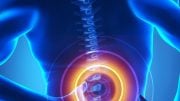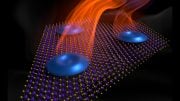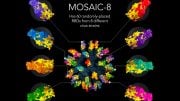
A groundbreaking study details the discovery of a unique autoantibody signature in approximately 10% of multiple sclerosis (MS) patients years before symptoms appear. By analyzing samples from a vast cohort of over 10 million individuals, researchers identified patients with elevated levels of specific autoantibodies and neurofilament light, suggesting early neuroaxonal damage. This finding could significantly improve early detection and treatment of MS, offering new hope for interventions before the disease progresses. Credit: SciTechDaily.com
A new study published in Nature Medicine unveils a major advance in the early detection and understanding of multiple sclerosis (MS). Researchers have identified a unique autoantibody signature present in approximately 10% of patients with MS years before the onset of clinical symptoms.
Autoantibodies are basically antibodies that are supposed to fight off invaders but end up turning against one’s own body, causing problems like autoimmune diseases. Utilizing the U.S. Department of Defense Serum Repository, a cohort encompassing more than 10 million individuals, researchers conducted whole-proteome autoantibody profiling on hundreds of MS patients’ samples collected before and after symptom onset. They discovered a distinct cluster of patients exhibiting an autoantibody signature targeting a common recognizable pattern. Notably, these patients showed antibody reactivity years before developing any MS symptoms and had elevated levels of serum neurofilament light (sNfL), indicating early neuroaxonal injury.
Research Implications and Future Directions
Danillo Augusto, Ph.D., an assistant professor in biology at the University of North Carolina at Charlotte and a co-author of the study, stated, “This study sheds light on the preclinical phase of MS and provides a promising avenue for early detection and intervention. Identifying patients at high risk of developing MS before symptom onset could revolutionize patient care and treatment strategies.”
Further validation of this autoantibody signature was conducted on samples from a separate MS cohort, confirming its high specificity for patients diagnosed with MS. This finding marks a significant milestone in MS research, potentially paving the way for the development of antigen-specific biomarkers for high-risk individuals with clinically or radiologically isolated neuroinflammatory syndromes.
The study, led by Michael Wilson, M.D., a professor of neurology at the University of California, San Francisco, offers hope for improved early diagnosis and intervention in MS, potentially leading to better patient outcomes. Further research is underway to elucidate the underlying immunological mechanisms and explore additional diagnostic and therapeutic implications.
Reference: “An autoantibody signature predictive for multiple sclerosis” by Colin R. Zamecnik, Gavin M. Sowa, Ahmed Abdelhak, Ravi Dandekar, Rebecca D. Bair, Kristen J. Wade, Christopher M. Bartley, Kerry Kizer, Danillo G. Augusto, Asritha Tubati, Refujia Gomez, Camille Fouassier, Chloe Gerungan, Colette M. Caspar, Jessica Alexander, Anne E. Wapniarski, Rita P. Loudermilk, Erica L. Eggers, Kelsey C. Zorn, Kirtana Ananth, Nora Jabassini, Sabrina A. Mann, Nicholas R. Ragan, Adam Santaniello, Roland G. Henry, Sergio E. Baranzini, Scott S. Zamvil, Joseph J. Sabatino Jr., Riley M. Bove, Chu-Yueh Guo, Jeffrey M. Gelfand, Richard Cuneo, H.-Christian von Büdingen, Jorge R. Oksenberg, Bruce A. C. Cree, Jill A. Hollenbach, Ari J. Green, Stephen L. Hauser, Mitchell T. Wallin, Joseph L. DeRisi and Michael R. Wilson, 19 April 2024, Nature Medicine.
DOI: 10.1038/s41591-024-02938-3









Be the first to comment on "Early Warning: New Biomarkers Predict MS Years Before Symptoms Appear"